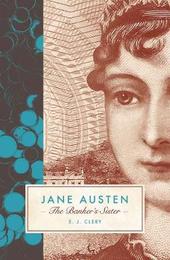
|
Jane Austen: The Banker's Sister
Hardback
Main Details
| Title |
Jane Austen: The Banker's Sister
|
| Authors and Contributors |
By (author) E. J. Clery
|
| Physical Properties |
| Format:Hardback | | Pages:400 | | Dimensions(mm): Height 234,Width 156 |
|
| ISBN/Barcode |
9781785901768
|
| Classifications | Dewey:823.7 |
|---|
| Audience | |
|---|
|
Publishing Details |
| Publisher |
Biteback Publishing
|
| Imprint |
Biteback Publishing
|
| Publication Date |
24 May 2017 |
| Publication Country |
United Kingdom
|
Description
When it was announced that Jane Austen would appear on the new GBP10 note in 2017, the 200th anniversary of her death, there was a flurry of media excitement. Few noted that a GBP10 Austen banknote was already in existence, albeit one issued by her brother. Henry Austen had set up as a banker in 1804, and built up a small empire of country banks. But Henry went unmentioned, for the good reason that he had gone spectacularly bust in the crash of 1816, the year before Jane died. The history of his rise and fall, moreover, consistently informed Jane's publishing career and imaginative life as a novelist. Henry acted as her agent, her first reader and her literary executor. Versions of Henry appear throughout her novels, not least in the charming but unscrupulous Henry Crawford in Mansfield Park. Exploring the close parallels between the speculative political economy of the late eighteenth century and the present day, Jane Austen: The Banker's Sister counters the stereotype of the spinster tucked away in a Hampshire village, detached from the great historical changes of her era. Based on wholly new research, including sensational new evidence of Henry's entanglements in the dissolute circle around the Prince Regent, this fascinating new volume will change the way Austen's life and her novels are understood.
Author Biography
E. J. Clery is a professor of English whose publications include The Rise of Supernatural Fiction, 1762-1800 (1995), Women's Gothic from Clara Reeve to Mary Shelley (2000), The Feminization Debate in Eighteenth-Century England (2004) and Eighteen Hundred and Eleven: Poetry, Protest, and Economic Crisis (2017). In 2013, she was awarded a Leverhulme Trust Major Research Fellowship to research Romantic-era women's writing and economic debate.She broadcasts and lectures on gothic literature, Jane Austen and her contemporaries, literary history and the cultural history of economics. Working at University of Southampton and the Centre for Early Women's Writing at Chawton Great House, which was formerly owned by Austen's brother Edward, she resides in Winchester, close to the cathedral where Jane Austen is buried.
ReviewsE. J. Clery's calmly commanding Jane Austen: The Banker's Sister makes some enlightening juxtapositions of material from the Austen family so as to suggest fresh things about the more familiar biographical arc of the author herself. A critic attuned to the practical pressures and the imaginative possibilities of economics in the period, Clery would be a perfect read for those who cannot understand why Austen should be on the GBP10. Bharat Tandon, Times Literary Supplement In her marvellous new book, Jane Austen: The Banker's Sister, E. J. Clery focuses on Henry and takes stock of undervalued aspects of Jane as well... superb. The Hudson Review Jane Austen, The Banker's Sister held me enthralled [...] It's full of exciting new information about Jane Austen's banker brother Henry, and therefore Jane herself. The linking of brother and sister as optimistic, courageous, even speculative fellow-spirits offers new insights about the woman we thought we knew. Clery's genial, accessible, and original book is a must read. Jocelyn Harris, author of Satire, Celebrity, and Politics in Jane Austen Considering how central a role economic considerations play in Jane Austen's novels (and her life) I'm amazed that no one seems to have written a book on this topic, until now. This work is a valuable and fascinating addition to what we know about Jane Austen. The Jane Austen Project Clery's masterful and scholarly interpretation of Austen's family dynamics, political links, and financial successes and failures provides an interesting and fresh approach to the study of this illustrious novelist's life and legacy. New York Journal of Books
|